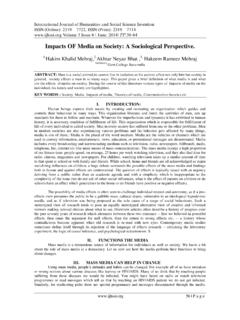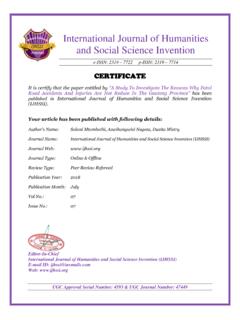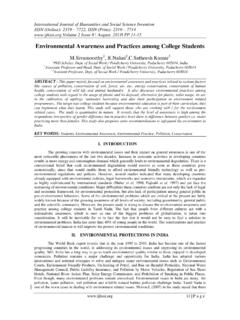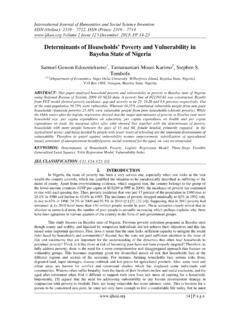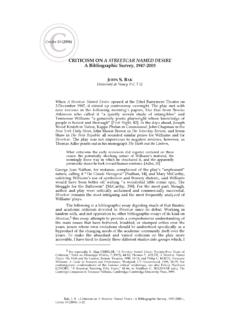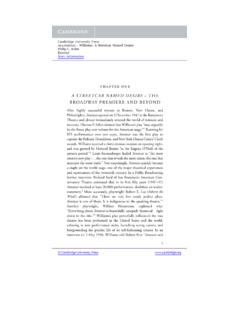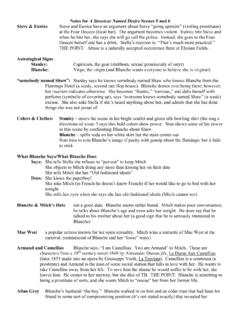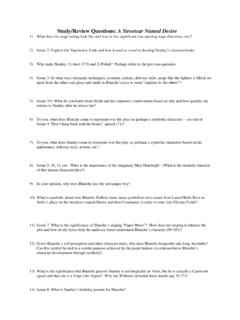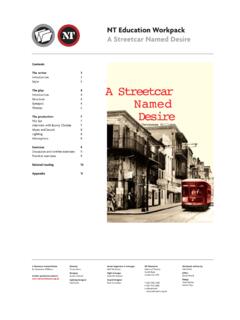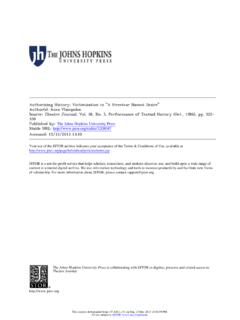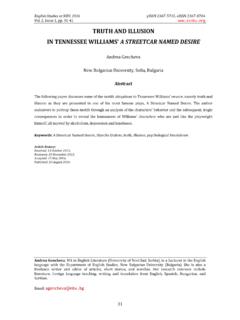Transcription of Phenomenological Understandings Of Varsouviana …
1 International Journal of Humanities and Social Science Invention ISSN (Online): 2319 7722, ISSN (Print): 2319 7714 Volume 3 Issue 6 June. 2014 1 | Page Phenomenological Understandings Of Varsouviana polka In Tennessee Williams s a streetcar named desire Yujin Jang Department of English Literature/ Yonsei University, South Korea ABSTRACT: Based on the examination of Edmund Husserl s phenomenology of time and its consciousness, this article investigates how Blanche DuBois s secondary memory of the musical tune, Varsouviana , influences on her present perceptions. As the secondary memory not only originates from retentions to perceive events that immediately become the past but also involves protentions to expect the fulfillment of previous occurrences in nearby future, Blanche s present moment haunted by Varsouviana sound cannot exist as itself.
2 Despite the implications of this polka tune, the melody cannot be shared with other characters in that it springs from Blanche s secondary memory. Ultimately, this article argues that Blanche s inability of illustrating the polka tune to other characters causes their misunderstandings of Blanche, who also fails in understanding her self-ego. KEYWORDS: Edmund Husserl, Misunderstanding, Secondary Memory, a streetcar named desire , Varsouviana I. INTRODUCTION Despite the fact that Tennessee Williams s a streetcar named desire treats the past memory of Blanche DuBois, a systematic analysis about the main character s consciousness of time and recollection of Varsouviana polka has been less carried out. In order to supplement the previous studies, thus, this article pursues an interdisciplinary approach to understand Blanche s present perception and her secondary memory, through applying Edmund Husserl s philosophical theory of phenomenology of the consciousness of internal time (1893-1917).
3 This approach contributes to explaining how the music tunes of Varsouviana haunting Blanche as her secondary memory consist of Blanche s current mental state, through focusing on each separate notion of retention, present perception, and protention, all of which are in fact connected as a unity to organize the flow of Blanche s present consciousness. II. Varsouviana IN a streetcar named desire Useless Attempt to Catch the Trace of Voice in The Broken Tower: An idea of Edmund Husserl regarding the perceptions of temporal objects either as momentary or enduring act (Husserl, 21) is needed to begin with grasping the notion of present moment. Husserl uses an example of a melody to explain this: The matter seems very simple at first: we hear the melody, that is, we perceive it, for hearing is indeed perceiving. However, the first tone sounds, then comes the second tone, then the third, and so on.
4 Must we not say: when the second tone sounds, I hear it, but I no longer hear the first tone, In truth, then, I do not hear the melody but only the single present tone. That the elapsed part of the melody is something objective for me, I owe or so one will be inclined to say to (Husserl, 25) Even though there is duration of a melody when it is heard, to say strictly, the listeners do not hear the whole melody but only do perceive a single tone consisting of the melody at their very present moment. The perceived tone, thus, immediately becomes the past from the present moment, and the continuity of these elapsed temporal objects composes memory. In this sense, Husserl s analysis of the consciousness of time offers a hint to understand the epigraph of a streetcar named desire this epigraph from The Broken Tower by Hart Crane indicates the source from which Blanche DuBois s memory of her past originates.
5 In other words, Husserl s concepts of present which is but to be changed into immediately past (Husserl, 26) that is involved in the primary memory (called as retention by Husserl) enable this epigraph to be re-illuminated as the explanations about the origin of Blanche s secondary memory of Varsouviana . Husserl expounds the difference between primary memory and secondary memory, saying that the former is a pure and simple (48) reproductive memory about the phase that has just happened, and the latter occurs when a subject tries to Phenomenological Understandings of 2 | Page reproduce or recollect the past in imagination without the perceptions of objects in reality. In this sense, the term of secondary memory can be exchanged with phantasy (47) which sometimes involves the errors of re-presentation (47) in the process of its formation.
6 The epigraph which can be interpreted with Husserl s theory of the consciousness of time is: And so it was I entered the broken world To trace the visionary company of love, its voice An instant in the wind (I know not whither hurled) But not for long to hold each desperate choice. In this broken world into which the persona enters in order to trace the visionary company of love, the voice of what the persona is looking for is suddenly transmitted by the wind but it does not stay not for long. It appears as an instant and soon disappears. However, when Husserl s idea of the consciousness of time is applied, the situation can be understood with the temporal concepts of present and retention. It is a fact that the persona perceives the voice of the visionary company of love in an instant of her present moment, which does instantly fall back to the past. In other words, the voice does not continue to sound anymore, even though it is clear that it has existed once a little while ago, and this whole situation forms retention in that the persona still holds the memory about the object which just goes through the transition from now-moment (Husserl, 26) of the present to immediate past.
7 As it is seen, the reason why the immediate disappearance of the voice matters in this passage is because it does not last long enough to hold each desperate choice, but in fact this is a natural phenomenon considering the essential trait of the present moment, which is depicted as an instant that cannot help but to be elapsed into the past and must be filled with a new now-moment. Husserl explains this with his Understandings of phenomenology of time: The whole extent of the tone s duration or the tone [that belongs to a melody, which is a unity of each separate tone that is heard in each now-moment of a subject who often regards the melody as a continual flow (25) rather than a combination of segmented tones] in its extension than stands before me as something dead [since the tone does not physically exist in the present moment but only in memory], so to speak something no longer being vitally generated, a formation no longer animated by the generative point of now but continuously modified and sinking back into emptiness.
8 (Husserl, 26) The short duration of the voice which rings only an instant in the wind is thus to be comprehended as the thing that is something dead since it is no longer being vitally generated or no longer animated by the generative point of now. Even though the each desperate choice which still exists in the mind of the persona needs a ground to be held fast not to be lost, and the voice heard as the trace of the visionary company of love is instantly regarded as the solution for the each desperate desire , the instant voice of love cannot be the breakthrough for the desperateness. Phenomenologically, the point of present which has to be occupied with new impression cannot coexist with what is no longer activated but recedes to the past. A problem can arise when this Phenomenological fact cannot be accepted by the persona if he or she is still preoccupied with the impression of the past, which can never be restored in the present in any way.
9 Varsouviana polka as Secondary Memory: However, this does not suggest that it is undesirable to keep a special memory of what has been found as the ideal in the past. Rather, these Phenomenological Understandings of time and its consciousness allow more strict way of categorizing the Varsouviana polka tune, which functions importantly as one of the theatrical designs to show how Blanche s present moments in reality are distorted with her past memory. About the Varsouviana polka , Annette Davison mentions the opinion of Irene M. Selznick who refers it as memory music, explaining the music that Blanche remembers was playing when her husband shot himself (Davison, 402, 404). Also, in the sense that this polka tune is closely related to Blanche s private memory of her past, Mary Ann Corrigan calls it as subjective music since only Blanche and the audience hear the Varsouviana polka , which was played as Blanche s husband shot himself.
10 The music, through its association in her memory with impending death, becomes a symbol of imminent disaster (Corrigan, 52). Corrigan s interpretation implies that there is a role of foreshadowing in the polka tune, which is often followed by imminent disaster, but Elia Kazan holds a different point of view since he feels that if any incidental music were heard prior to the cue, it would suggest that the Varsouviana was also incidental rather than subjective that is, heard only by Blanche (qtd. in Davison, 407). Kazan s view is that the interference of the polka tune in Blanche s mind occurs incidentally as well as intermittently which suggests that Blanche cannot control the appearance of the music to her mind, and this is ultimately connected to the lacking of subjectivity of Blanche whose mental state haunted by the memory of the past. Both Davison and Corrigan mention that Phenomenological Understandings of 3 | Page Varsouviana is the music about Blanche s memory, however, to be more exact, this belongs to the secondary memory, which has its distinctions from those of primary memory of retention.

